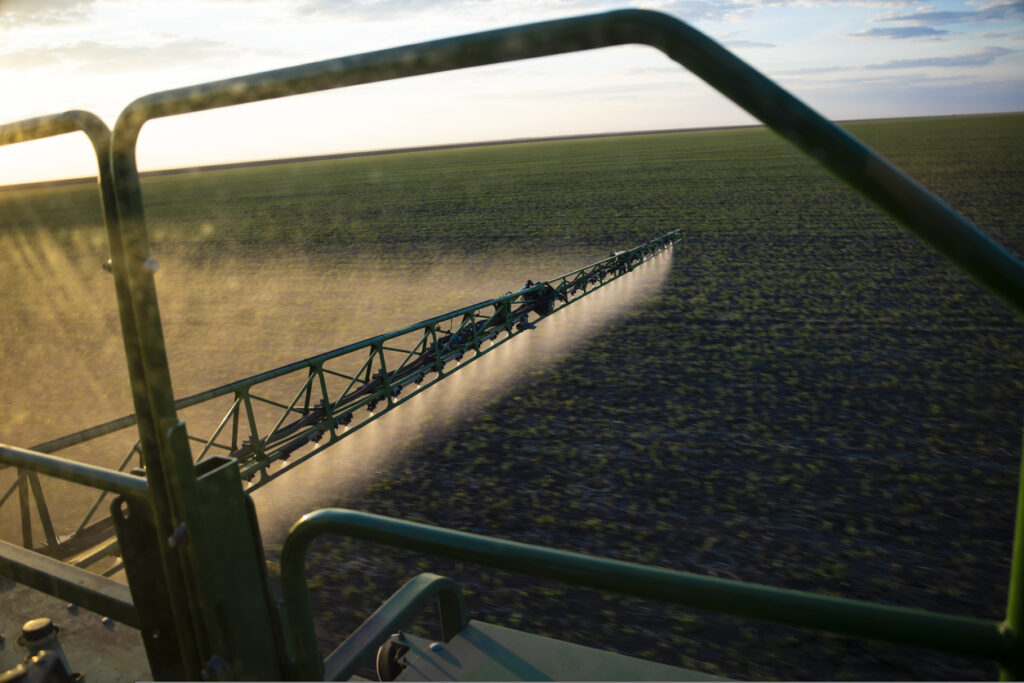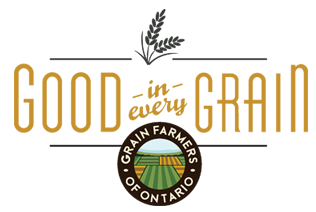Why do farmers spray their crops?

A question I have heard many times is, “Why do Ontario grain farmers spray their crops?”. There are a lot of negative feelings towards farmers using pesticide sprays to protect their growing plants, particularly when a person feels that those products are “harmful” on our food source.
Ontario grain farmers may choose to spray their crops to protect their growing plants from threats that would destroy the entire field of barley, corn, oats, soybeans, or wheat. Organic and conventional farmers may use sprays if they choose. Organic farmers use organically classified pesticides, whereas conventional farmers (like my family) can choose to use synthetic pesticides.
Why do we choose to use synthetic pesticides?
Well, it’s a two-fold answer. We choose to spray to ensure the grains we are growing are going to be suitable for food use. We spray to protect our plants and the grain seeds that will be harvested against insect or disease damage. If the grain seeds we harvest show insect or disease damage/presence, those grain seeds can not be used for food and we will have to sell the grain at a lower price. Wheat, for example, can develop a mouldy fungus called Fusarium Head Blight. We spray a fungicide to prevent this mould from growing. Not only does spraying a fungicide ensure that this wheat can be used for food products such as flour or noodles, but it also makes sure the wheat seeds going into our food supply is safe. Fusarium Head Blight, if consumed, can make people very sick.
“No one wants to eat bread made from mouldy wheat flour, right? This food protection starts at the farm”.
Secondly, we spray synthetic pesticides because we have seen firsthand how weeds can destroy an entire field of corn or soybeans. Weeds are very powerful plants that can overtake a growing crop and “steal” sunlight, water, soil nutrients, and even soil space. The growing crop may not stand a chance against weeds. If we let weeds overtake our entire corn crop because we decided not to spray any herbicides, how will that affect the food supply? How would this affect our food prices at the grocery store? There would be less corn going into our food supply because those seeds and plants died in the fields. Less food means more expensive food. We are doing our part to keep food prices down by protecting the grains as they grow so there is enough food to make it to the grocery store.
Are there things we can do to limit how much we spray?
Of course! On our farm, we grow different crops in our fields each year (called crop rotation). Crop rotation helps break the life-cycle of insects and diseases that can only survive on one type of crop. We follow a three-year rotation on most of our fields: soybeans, wheat, corn.
Keeping buffer strips of trees, long grass, or unused field area between our fields to help prevent the spread of insects or diseases between neighbouring fields. Insects or disease spores get caught up in this buffer strip and don’t make it to the next field to spread the threat.
We can also plant cover crops to help control weeds in a field, or grow a hardier grain type that can grow against the weed competition.
Lastly, in the spring we use tillage to break up the soil in order to plant our grains. This minimal tillage also helps to break down growing weed plants, so we don’t have to spray them.
#YourFarmers are using innovative practices to ensure they are going to keep growing healthy, quality grains that can be used in our food system. Spraying pesticides (synthetic or organic) are a part of this process to help protect our growing grains to ensure there is enough affordable and healthy food at the grocery store.
